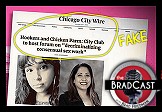 Vote-PAD, the simple plastic and paper voting device meant to assist voters with disabilities and provide a countable paper ballot as an alternative to the expensive, insecure, un-recountable, hackable Electronic Voting Machines made by companies such as Diebold and ES&S, has just been approved for use by the state of Wisconsin!
Vote-PAD, the simple plastic and paper voting device meant to assist voters with disabilities and provide a countable paper ballot as an alternative to the expensive, insecure, un-recountable, hackable Electronic Voting Machines made by companies such as Diebold and ES&S, has just been approved for use by the state of Wisconsin!
According to a just-issued press release (posted in full at the bottom of this item), Vote-PAD, which derives it's name from "Voting-on-Paper Assistive Device", is announcing that the Wisconsin State Elections Board has approved the device for use in the state after conferring with attorneys at the U.S. Department of Justice.
Recently we reported on the Vote-PAD, describing it as a simple, non-electronic voting device that "could save American democracy." The company had just announced their first contract with Yolo County, California at the time. The new announcement by Wisconsin represents the first full state to announce their approval of the Vote-PAD device for use by disabled voters.
The Wisconsin announcement notably includes information on clearance for use of the device after consultations with attorneys in the "Voting Section of the Civil Rights Division at the U.S. Department of Justice," according to an email obtained by The BRAD BLOG. The email was written by the executive director of Wisconsin's State Elections Board, and will likely kick national interest in Vote-PAD into high gear...
As The BRAD BLOG has reported on many occassions, states and counties around the country continue to struggle to meet the mandate of the Help America Vote Act (HAVA) guidelines requiring at least one disabled-accessible voting device in every precinct in the country. The deadline for jurisdications to arrange for such devices was January 1, 2006. However, many jurisdications are still searching desperately to find a solution which is both secure, usable by the disabled community and allowed under HAVA guidelines.
A recent hack of Diebold optical scan machines has revealed that the Voting Machine Company has used "intepreted code" in their voting equipment. That type of programming code --- the exploitation of which allowed the results of a recent test election in Leon County, Florida to be completely flipped without a trace left behind --- is specifically banned by HAVA guidelines. In light of that "Hack Test", the state of California and others have asked Federal Authorities to re-examine the issue in order to determine if those machines are in violation of HAVA. A report on the matter is expected soon.
According to Vote-PAD's release, Wisconsin State Elections Board executive director, Kevin Kennedy, announced the state's approval of the Vote-PAD today after "considerable time" spent conferring with U.S. Dept. of Justice attorneys. The response, he said, after examining the device, was that the DoJ saw nothing "that should stop Wisconsin from proceeding with approval" of Vote-PAD for use in the state.
In an email announcing the results of the DoJ consultations, Kennedy indicated he was comfortable with the Voting Rights attorney's assessment of Vote-PAD. "I did not expect them to give a thumbs up or thumbs down on the Vote Pad and they were clear that they were not in a position to do so," Kennedy wrote. "There was an indication that they did not see anything that should stop Wisconsin from proceeding with approval."
Ellen Theisen, President of Vote-PAD and former executive director of VotersUnite.org, a non-profit elections watchdog organization, is understandably thrilled by the developments.
"We are delighted!," Theisen says in the release. "One of our immediate goals was to offer the small Wisconsin municipalities a low cost, low tech, reasonable alternative to electronic voting. This approval is a real win for the small communities and the state of Wisconsin."
Electronic Touch-Screen devices, such as those made by major Voting Machine Manufacturers such as Diebold, Inc. and ES&S have come under a great deal of fire from critics who point to a great deal of evidence --- including a major report from the non-partisan Governmental Accountability Office (GAO) --- that such machines do not record votes accurately. Indeed, overwhelming evidence has revealed that thousands of votes have been lost and/or changed in recent elections where such machines have been used. The problem is particularly troubling where voter-verified paper ballots were neither produced nor counted in the tally of election results.
Vote-PAD uses a simple plastic "overlay" to assist voters with disabilities, such as the blind, in casting their vote without the aid of an assistant. Because it uses no software (secret or otherwise) and no electronics to cast a vote, it is in compliance with HAVA, the company suggests. The device is used in conjunction with a paper ballot which may then be either hand-counted or tallied by an optical scan tabulation machine.
More information, and links to press coverage of Vote-PAD can be found in our original article. Their website is at www.Vote-PAD.us. The latest press release from the company, concerning the Wisconsin announcement and the news from the Dept. of Justice, is posted in full below...
Contact: Dianna Smith, dianna@vote-pad.us
WISCONSIN APPROVES VOTE-PAD ASSISTIVE DEVICE
U.S. Department of Justice consultation allows state to begin using new non-electronic voting solution meant to aid disabled voters in casting private, secure vote in according with Help America Vote Act.
Port Ludlow, WA --- Vote-PAD, Inc. is proud to announce that the Vote-PAD (Voting-on-Paper Assistive Device) has been approved by the Wisconsin State Elections Board for use in hand-counted paper ballot municipalities.
The Vote-PAD is an inexpensive, non-computerized, voter-assist device that helps people with visual or dexterity impairments to independently and privately mark the same paper ballot as other voters. The Vote-PAD was developed to help small towns and counties comply with the accessibility requirement of the federal Help America Vote Act of 2002. It allows them to continue administering elections the same way they have in the past.
After meeting with U.S. Department of Justice attorneys, Kevin Kennedy, Executive Director of the Wisconsin State Elections Board, announced the state's approval of the Vote-PAD. Mr. Kennedy said the attorneys spent considerable time looking at the device and asking questions about its use in the voting process. It was indicated, he said, "that they did not see anything that should stop Wisconsin from proceeding with approval."
Ellen Theisen, President of Vote-PAD, Inc. and developer of the device, said, "We are delighted! One of our immediate goals was to offer the small Wisconsin municipalities a low cost, low tech, reasonable alternative to electronic voting. This approval is a real win for the small communities and the state of Wisconsin."
The Vote-PAD has also attracted interest in larger jurisdictions that use optical scanners to count ballots. It was recently purchased by Yolo County, California. See the county's press release. (http://www.vote-pad.us/M...YoloCitizensWillVote.htm)
Towns and counties all across the country are struggling with how best to meet federal requirements. The law requires each polling place to have a method by which individuals with disabilities can vote unassisted.
As evidence mounts about the failures of computerized voting systems and also the lack of accessibility of many of them, it is difficult for jurisdictions to know where to turn.
"For many jurisdictions, the Vote-PAD provides the most reasonable solution," Ms. Theisen says. "It is neither a computerized device, nor a voting system. With the Vote-PAD, assistance is simple and direct. It allows individuals to retain the dignity of marking a paper ballot the way other voters do."
The Vote-PAD, developed in close and continuing consultation with members of the disabilities community, has performed successfully for people with a wide range of disabilities including those with visual or dexterity impairments.
###


 Trump's Ridiculous 'Immunity' Case Heard by Corrupted SCOTUS: 'BradCast' 4/25/24
Trump's Ridiculous 'Immunity' Case Heard by Corrupted SCOTUS: 'BradCast' 4/25/24 'Green News Report' 4/25/24
'Green News Report' 4/25/24
 NY Trump Trial Mid-Week Ketchup: 'BradCast' 4/24/24
NY Trump Trial Mid-Week Ketchup: 'BradCast' 4/24/24 'Election Fraud, Pure and Simple': 'BradCast' 4/23/24
'Election Fraud, Pure and Simple': 'BradCast' 4/23/24 'Green News Report' 4/23/24
'Green News Report' 4/23/24 'First Domino Falls' in UAW Effort to Unionize the South: 'BradCast' 4/22/24
'First Domino Falls' in UAW Effort to Unionize the South: 'BradCast' 4/22/24 Sunday 'Popcorn Ready' Toons
Sunday 'Popcorn Ready' Toons Bad Climate News for Home, Car Owners; Good Labor News for Workers in the South: 'BradCast' 4/18/24
Bad Climate News for Home, Car Owners; Good Labor News for Workers in the South: 'BradCast' 4/18/24 'Green News Report' 4/18/24
'Green News Report' 4/18/24 SCOTUS Suddenly Worried About Overcriminalization ... for J6 Insurrectionists: 'BradCast' 4/17/24
SCOTUS Suddenly Worried About Overcriminalization ... for J6 Insurrectionists: 'BradCast' 4/17/24 'Trump Media' Plummeting, MAGA Buyers Losing Life Savings: 'BradCast' 4/16/24
'Trump Media' Plummeting, MAGA Buyers Losing Life Savings: 'BradCast' 4/16/24 'Green News Report' 4/16/24
'Green News Report' 4/16/24 Trump's First Criminal Trial, for Cheating in 2016, Begins in NY: 'BradCast' 4/15/24
Trump's First Criminal Trial, for Cheating in 2016, Begins in NY: 'BradCast' 4/15/24 Sunday 'Party Like It's 1864' Toons
Sunday 'Party Like It's 1864' Toons Biden Closes 'Gun Show Loophole'; Repubs Turn Desperate: 'BradCast' 4/11/24
Biden Closes 'Gun Show Loophole'; Repubs Turn Desperate: 'BradCast' 4/11/24 'Green News Report' 4/11/24
'Green News Report' 4/11/24 'Pink Slime': Fake 'Local News' Sites Proliferating in Advance of Election: 'BradCast' 4/10/24
'Pink Slime': Fake 'Local News' Sites Proliferating in Advance of Election: 'BradCast' 4/10/24 Dirty Tricks and the Dirtiest Candidate Of All Time: 'BradCast' 4/9/24
Dirty Tricks and the Dirtiest Candidate Of All Time: 'BradCast' 4/9/24 'Titanic Law' Reform Just Tip of Iceberg in Quest for Key Bridge Accountability: 'BradCast' 4/8/24
'Titanic Law' Reform Just Tip of Iceberg in Quest for Key Bridge Accountability: 'BradCast' 4/8/24 Trump's Very Bad Day in Court(s), Other Good (& Less Good) News: 'BradCast' 4/424
Trump's Very Bad Day in Court(s), Other Good (& Less Good) News: 'BradCast' 4/424 WI Supremes May Restore Drop-Box Voting
WI Supremes May Restore Drop-Box Voting WI Voters Approve Election Crippling Ballot Measures: 'BradCast' 4/3/24
WI Voters Approve Election Crippling Ballot Measures: 'BradCast' 4/3/24 Politico's Josh Gerstein Owes a Retraction
Politico's Josh Gerstein Owes a Retraction More GOP Election Fraud; Overdue Justice for Crystal Mason: 'BradCast' 4/2/24
More GOP Election Fraud; Overdue Justice for Crystal Mason: 'BradCast' 4/2/24
 VA GOP VOTER REG FRAUDSTER OFF HOOK
VA GOP VOTER REG FRAUDSTER OFF HOOK Criminal GOP Voter Registration Fraud Probe Expanding in VA
Criminal GOP Voter Registration Fraud Probe Expanding in VA DOJ PROBE SOUGHT AFTER VA ARREST
DOJ PROBE SOUGHT AFTER VA ARREST Arrest in VA: GOP Voter Reg Scandal Widens
Arrest in VA: GOP Voter Reg Scandal Widens ALL TOGETHER: ROVE, SPROUL, KOCHS, RNC
ALL TOGETHER: ROVE, SPROUL, KOCHS, RNC LATimes: RNC's 'Fired' Sproul Working for Repubs in 'as Many as 30 States'
LATimes: RNC's 'Fired' Sproul Working for Repubs in 'as Many as 30 States' 'Fired' Sproul Group 'Cloned', Still Working for Republicans in At Least 10 States
'Fired' Sproul Group 'Cloned', Still Working for Republicans in At Least 10 States FINALLY: FOX ON GOP REG FRAUD SCANDAL
FINALLY: FOX ON GOP REG FRAUD SCANDAL COLORADO FOLLOWS FLORIDA WITH GOP CRIMINAL INVESTIGATION
COLORADO FOLLOWS FLORIDA WITH GOP CRIMINAL INVESTIGATION CRIMINAL PROBE LAUNCHED INTO GOP VOTER REGISTRATION FRAUD SCANDAL IN FL
CRIMINAL PROBE LAUNCHED INTO GOP VOTER REGISTRATION FRAUD SCANDAL IN FL Brad Breaks PA Photo ID & GOP Registration Fraud Scandal News on Hartmann TV
Brad Breaks PA Photo ID & GOP Registration Fraud Scandal News on Hartmann TV  CAUGHT ON TAPE: COORDINATED NATIONWIDE GOP VOTER REG SCAM
CAUGHT ON TAPE: COORDINATED NATIONWIDE GOP VOTER REG SCAM CRIMINAL ELECTION FRAUD COMPLAINT FILED AGAINST GOP 'FRAUD' FIRM
CRIMINAL ELECTION FRAUD COMPLAINT FILED AGAINST GOP 'FRAUD' FIRM RICK SCOTT GETS ROLLED IN GOP REGISTRATION FRAUD SCANDAL
RICK SCOTT GETS ROLLED IN GOP REGISTRATION FRAUD SCANDAL VIDEO: Brad Breaks GOP Reg Fraud Scandal on Hartmann TV
VIDEO: Brad Breaks GOP Reg Fraud Scandal on Hartmann TV RNC FIRES NATIONAL VOTER REGISTRATION FIRM FOR FRAUD
RNC FIRES NATIONAL VOTER REGISTRATION FIRM FOR FRAUD EXCLUSIVE: Intvw w/ FL Official Who First Discovered GOP Reg Fraud
EXCLUSIVE: Intvw w/ FL Official Who First Discovered GOP Reg Fraud GOP REGISTRATION FRAUD FOUND IN FL
GOP REGISTRATION FRAUD FOUND IN FL


































